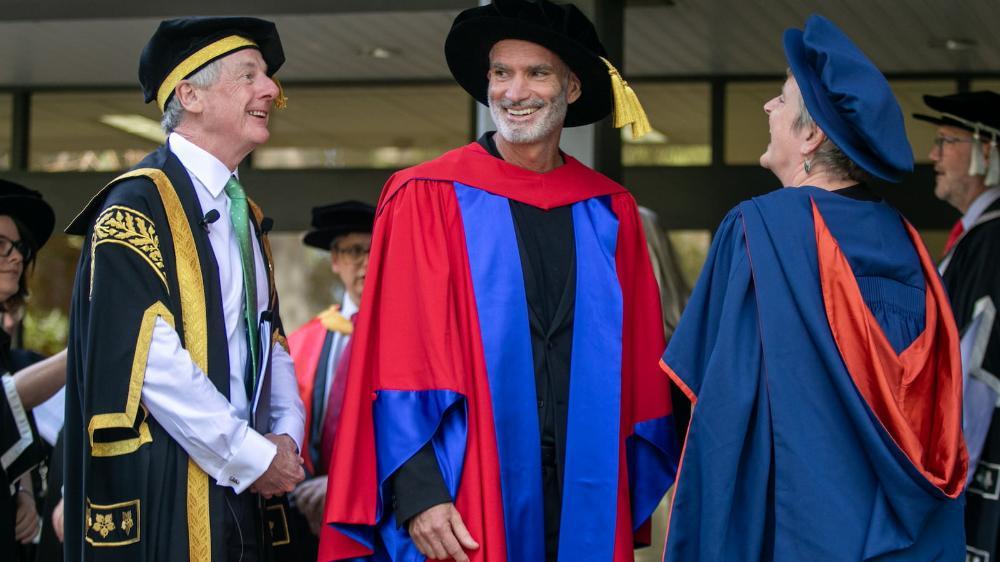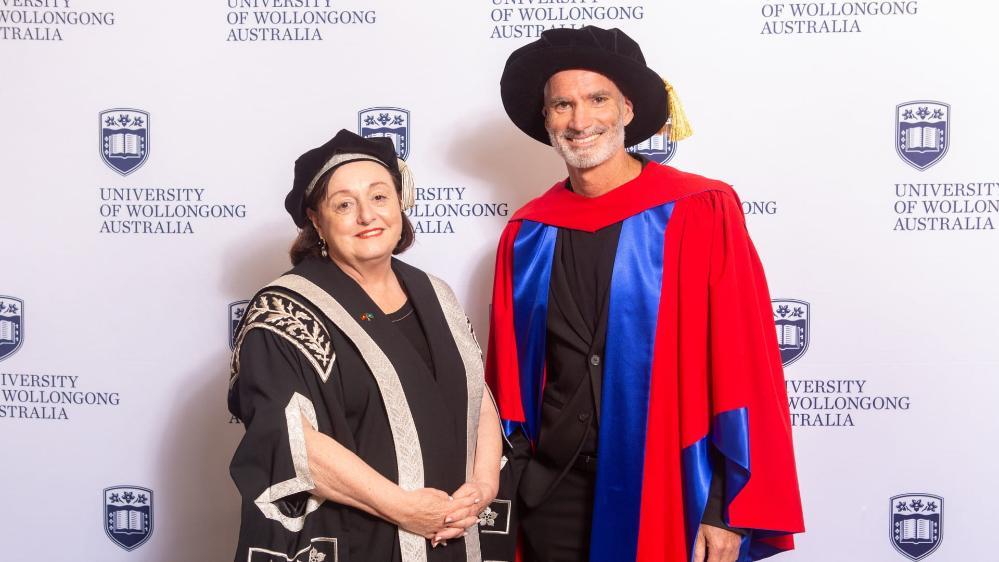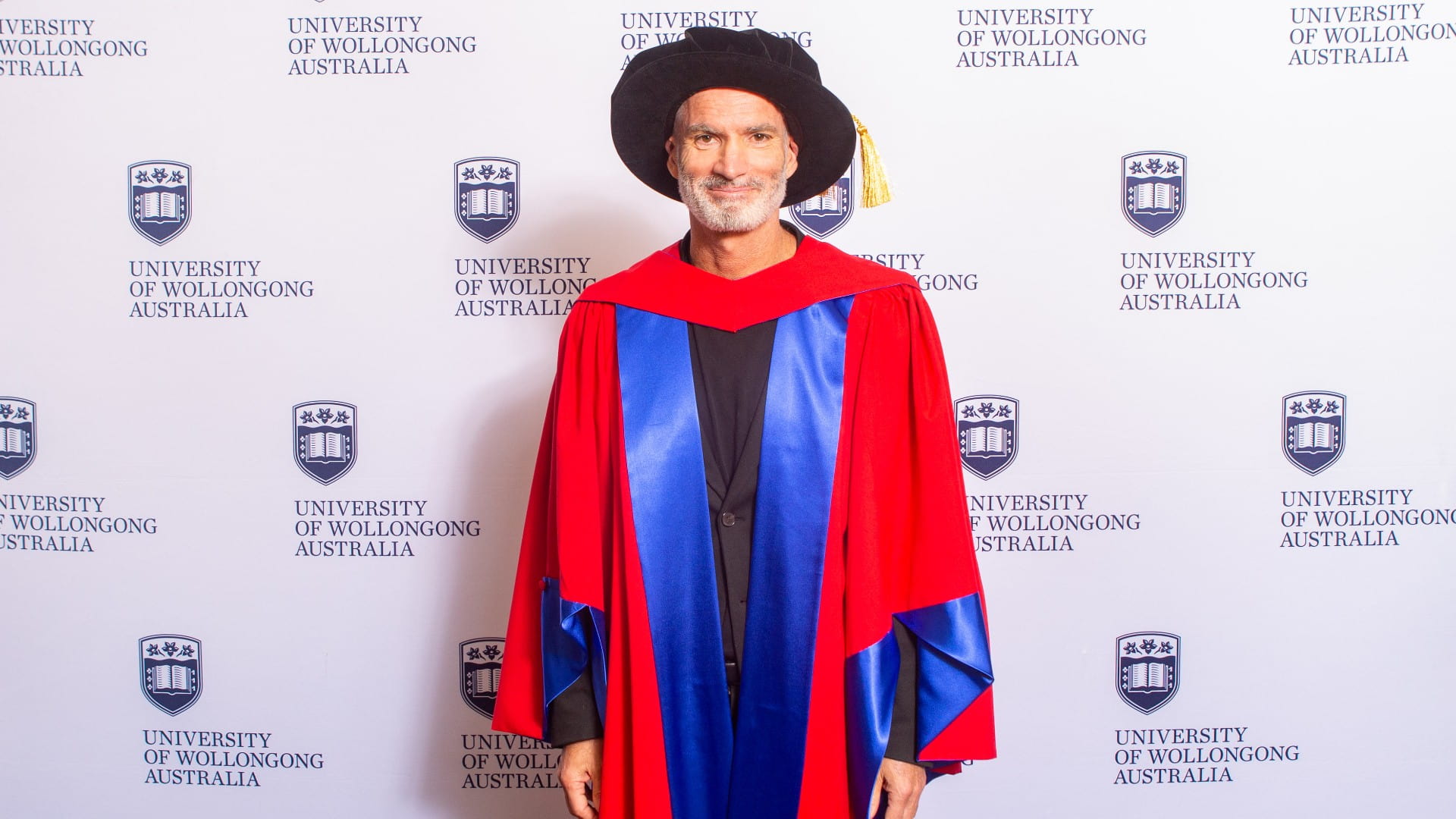April 17, 2024
Craig Foster AM receives Honorary Doctor of Laws
Human rights activist and renowned sports broadcaster recognised for contribution to social justice
For a long time, Craig Foster AM was best known for his achievements on the football field.
But in recent years, Foster has become best known for his achievements off the field.
Foster was yesterday (Tuesday 16 April) honoured with a Doctor of Laws (honoris causa) during the University of Wollongong’s (UOW) Faculty of Business and Law graduation.
In presenting Foster with the honorary doctorate, UOW Chancellor Michael Still, the Presiding Officer of the ceremony, said his actions reflected the values that UOW holds dear.
“Dedicating his recent years to advocating for refugees and asylum seekers, Craig actively promotes anti-racism and allyship, and is an advocate for what he terms ‘active multiculturalism’, emphasising the importance of communities protecting each other,” Mr Still said.
“His exemplary commitment to social justice and human rights, particularly for those held in detention centres, has made a significant impact on the lives of the vulnerable and marginalised.
“His commitment to social justice and human rights is an inspiration and his recognition stands as a testament to the University of Wollongong’s dedication to fostering a socially just and inclusive society.”
From the age of 15, Foster played football for Australia, first in the FIFA Under 16 World Cup in China, and then the Socceroos. He spent five years with the national team, between 1996 and 2000, and was captain for 29 matches.
Although advocacy wasn’t necessarily front of mind, and he was focused on building his career on the pitch, Foster was always drawn to the sense of community and multiculturalism that his beloved sport offered.
Following his retirement, Foster become one of Australia’s most respected sports broadcasters, a career shift that encompassed 10 FIFA World Cups and countless games for the UEFA Champions League, English Premier League and domestic competitions. He spent 18 years at SBS before moving to Stan Sport Australia in 2020.
Football and advocacy were not mutually exclusive, however, and Foster saw the power of using his profile, and his extensive experience in the multicultural world of football, to effect change.

UOW Deputy Chancellor Robert Ryan with Craig Foster and Professor Grace McCarthy.
Renowned for his tireless efforts, Foster played a pivotal role in the successful campaign to free Bahraini footballer and refugee Hakeem al-Araibi from Thai imprisonment in 2019. Furthermore, he provided essential support to the Afghan women's national football team and other female athletes fleeing the Taliban, showcasing his unwavering commitment to humanitarian causes.
“As a young professional athlete, it was clear to see how valuable notoriety through sport could be, and I used my position to help across many issues from homelessness to women’s rights, First Nations rights and racial justice to climate action and accountability. A turning point was undoubtedly the #SaveHakeem campaign on late 2018 which reached over 30 million supporters in Australia and around the world, provided an international network of civil society organisations working for democracy and social reform and provided public visibility that could be leveraged further.
“The power of sport is such that it touches every country, every ethnicity, every religion around the world and acts as a shared space for us to have conversations about the world we want to create. Sport’s own internal motivation is often lacking to use its social and political power, but the fact remains that it is a connecting force that can promote important messages, uncover inequities and challenge society to be better.”
As a member of the Australian Multicultural Council and an Ambassador for Amnesty Australia, Foster actively contributes to a myriad of social programs, ranging from Indigenous rights and self-determination to climate action and gender equality. His role as a Strategic Advisor for Frontrunners and No 2nd Place, coupled with his advocacy for climate action in the realm of international football, exemplifies his multifaceted approach to driving positive change.
His numerous accolades underscore his exceptional contributions. In 2021, Foster was appointed a Member of the Order of Australia (AM) for significant service to multiculturalism, to human rights and refugee support organisations, and to football. His advocacy work extends beyond the spotlight, as evidenced by his volunteer efforts at the Addison Road community food pantry.
In addition to his broadcasting role, Foster has continued to maintain his connection to the world of sport. He now advises high-profile sportspeople on how to use their platform for social change and is the Adjunct Professor of Sport and Social Responsibility for Torrens University.
Sport and advocacy are natural partners, Foster said, each requiring hard work and dedication. Increasingly, he is seeing athletes willing to speak up for causes they believe in.
“In sport, achievements take time and dedication, day after day. They do not happen without hard work, large teams of people and a shared commitment. Social justice is the same. Anything worthwhile takes time and great effort, and helping others or ensuring that Australia’s future is one of cultural and social equity requires commitment over time,” he said.
“When we understand this, we can maintain motivation, keep working towards important goals and understand that counter challenges are not only expected, but necessary to understand the context and sharpen our thinking and approach. Team sport athletes spend their profession competing against hostile opponents, and therefore understanding the predictable reactions is an important part of navigating through difficult subjects.”

UOW Vice-Chancellor Professor Patricia Davidson and Craig Foster.
Foster’s work in social justice has been an ongoing lesson in the power of the collective to create change, he told the graduating cohort of students as he accepted his Honorary Doctorate.
“Each of us has the power to help shape what the future of Australia, and the world looks like through our actions, interactions, policies, statements, decisions, what we are silent about as much, if not more, than what we speak out for,” he said. “It only takes one of us with a deep passion to move many. I have seen that firsthand.”
Foster urged the graduates to fight for their beliefs and to look beyond the usual metrics for success to focus on leaving the world a better, kinder, more compassionate and equal place.
“Be more than a degree or a title. A CEO, architect, engineer, biologist are not only that, but people. Our humanity and sense of collective responsibilities should be part of our everyday life, not something we use outside of office working hours. The paradigm that said everything is permissible, even killing the planet as long as we implement organisational goals is long dead.
“We are humans first, professionals second, and the state of the environment, the planet, the division that we see being stoked between different communities is an imperative to recalibrate our sense of what is important. Work hard, aspire and achieve. And do it as your full, caring, self.”
